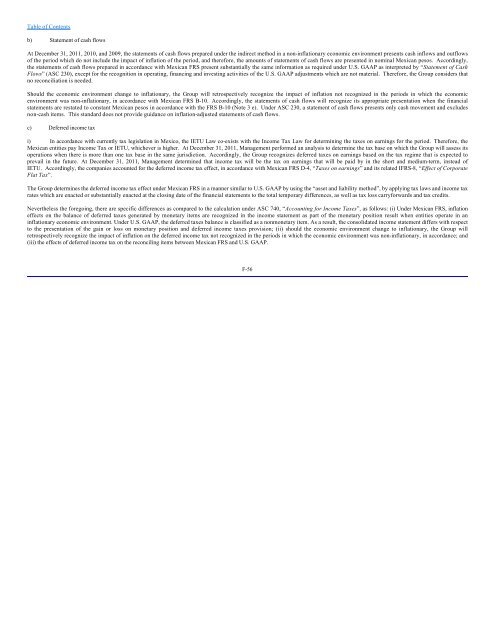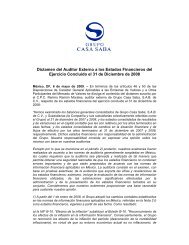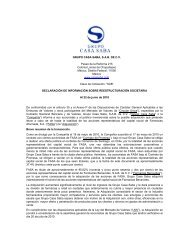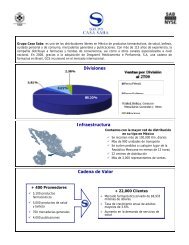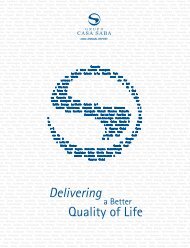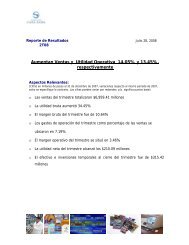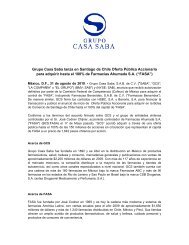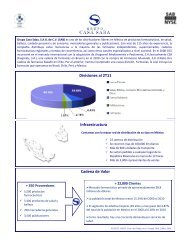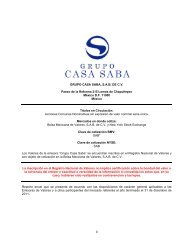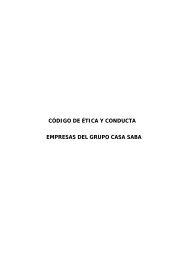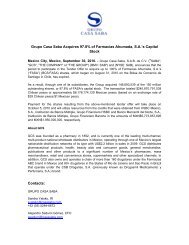FORM 20-F Grupo Casa Saba, S.A.B. de C.V.
FORM 20-F Grupo Casa Saba, S.A.B. de C.V.
FORM 20-F Grupo Casa Saba, S.A.B. de C.V.
You also want an ePaper? Increase the reach of your titles
YUMPU automatically turns print PDFs into web optimized ePapers that Google loves.
Table of Contents<br />
b) Statement of cash flows<br />
At December 31, <strong>20</strong>11, <strong>20</strong>10, and <strong>20</strong>09, the statements of cash flows prepared un<strong>de</strong>r the indirect method in a non-inflationary economic environment presents cash inflows and outflows<br />
of the period which do not inclu<strong>de</strong> the impact of inflation of the period, and therefore, the amounts of statements of cash flows are presented in nominal Mexican pesos. Accordingly,<br />
the statements of cash flows prepared in accordance with Mexican FRS present substantially the same information as required un<strong>de</strong>r U.S. GAAP as interpreted by “Statement of Cash<br />
Flows” (ASC 230), except for the recognition in operating, financing and investing activities of the U.S. GAAP adjustments which are not material. Therefore, the Group consi<strong>de</strong>rs that<br />
no reconciliation is nee<strong>de</strong>d.<br />
Should the economic environment change to inflationary, the Group will retrospectively recognize the impact of inflation not recognized in the periods in which the economic<br />
environment was non-inflationary, in accordance with Mexican FRS B-10. Accordingly, the statements of cash flows will recognize its appropriate presentation when the financial<br />
statements are restated to constant Mexican pesos in accordance with the FRS B-10 (Note 3 e). Un<strong>de</strong>r ASC 230, a statement of cash flows presents only cash movement and exclu<strong>de</strong>s<br />
non-cash items. This standard does not provi<strong>de</strong> guidance on inflation-adjusted statements of cash flows.<br />
c) Deferred income tax<br />
i) In accordance with currently tax legislation in Mexico, the IETU Law co-exists with the Income Tax Law for <strong>de</strong>termining the taxes on earnings for the period. Therefore, the<br />
Mexican entities pay Income Tax or IETU, whichever is higher. At December 31, <strong>20</strong>11, Management performed an analysis to <strong>de</strong>termine the tax base on which the Group will assess its<br />
operations when there is more than one tax base in the same jurisdiction. Accordingly, the Group recognizes <strong>de</strong>ferred taxes on earnings based on the tax regime that is expected to<br />
prevail in the future. At December 31, <strong>20</strong>11, Management <strong>de</strong>termined that income tax will be the tax on earnings that will be paid by in the short and medium-term, instead of<br />
IETU. Accordingly, the companies accounted for the <strong>de</strong>ferred income tax effect, in accordance with Mexican FRS D-4, “Taxes on earnings” and its related IFRS-8, “Effect of Corporate<br />
Flat Tax”.<br />
The Group <strong>de</strong>termines the <strong>de</strong>ferred income tax effect un<strong>de</strong>r Mexican FRS in a manner similar to U.S. GAAP by using the “asset and liability method”, by applying tax laws and income tax<br />
rates which are enacted or substantially enacted at the closing date of the financial statements to the total temporary differences, as well as tax loss carryforwards and tax credits.<br />
Nevertheless the foregoing, there are specific differences as compared to the calculation un<strong>de</strong>r ASC 740, “Accounting for Income Taxes”, as follows: (i) Un<strong>de</strong>r Mexican FRS, inflation<br />
effects on the balance of <strong>de</strong>ferred taxes generated by monetary items are recognized in the income statement as part of the monetary position result when entities operate in an<br />
inflationary economic environment. Un<strong>de</strong>r U.S. GAAP, the <strong>de</strong>ferred taxes balance is classified as a nonmonetary item. As a result, the consolidated income statement differs with respect<br />
to the presentation of the gain or loss on monetary position and <strong>de</strong>ferred income taxes provision; (ii) should the economic environment change to inflationary, the Group will<br />
retrospectively recognize the impact of inflation on the <strong>de</strong>ferred income tax not recognized in the periods in which the economic environment was non-inflationary, in accordance; and<br />
(iii) the effects of <strong>de</strong>ferred income tax on the reconciling items between Mexican FRS and U.S. GAAP.<br />
F-56


